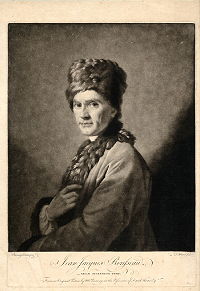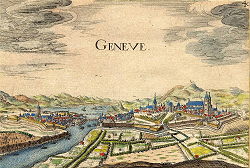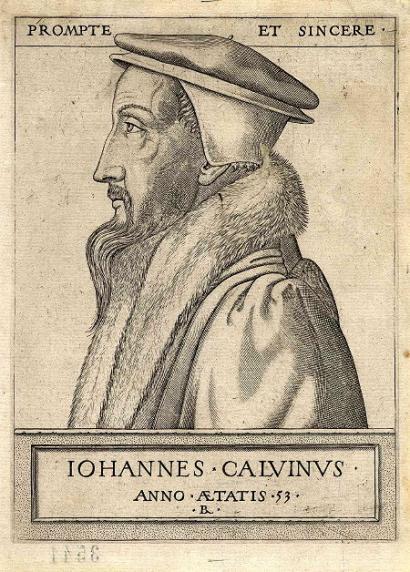During the celebration of the tri-centennial of the birth of Jean-Jacques Rousseau, the musée Jean Calvin sheds light on the various aspects of the links between the philosopher of Enlightenment and the great Reformer of the Renaissance. Rousseau's life was exceptionally rich and varied and here we follow it chronologically, from his Geneva origins to his wanderings throughout Europe, looking closely at the crucial moments of his moral and intellectual itinerary. The exhibition presents printed and hand written pieces from various origins, in particular from public libraries in Geneva and Neuchâtel, in Switzerland, as well as from the Société de l'histoire du protestantisme français (the Society of the history of French Protestantism) and the musée Jean-Jacques Rousseau in Montmorency, France.
 David Martin, after Allan Ramsay, Jean Jacques Rousseau, 1766.© Musée Jean-Jacques Rousseau - Montmorency
/ Photo Laure Querouil, inv. 2003.2.138
While Jean Calvin and his belief in man's guilt in face of original sin seems light years away from the defender of original, natural kindness, Jean-Jacques Rousseau, there are many opportunities to put these two major figures of Western thinking face to face. First of all, there is of course a common destiny between Switzerland and the Oise region. Calvin, born in Noyon in 1509, fully developed his thinking in Geneva, while Rousseau, born exactly three centuries ago in Geneva, lived his last and happy years in the Oise region, at Ermenonville, the guest of the marquis de Girardin.
Aside from this simple anecdote, or of these trips back and forth, two centuries apart, those who wish to look further into Jean-Jacques' life and work will find many opportunities to see the similarities between the two men. That is the reason why the musée Jean Calvin in Noyon, true to its will to explore new areas for exhibitions, has decided to present these two major figures together, for the first time in France.
The religious issue
The exhibition develops the theme of religion and more specifically that of Calvinism in the thinking, life and works of Jean-Jacques Rousseau, by paying particular attention to the chaotic path of his religious evolution. The exhibit also presents Calvin's sayings quoted by Rousseau or his correspondents. While the reference to Protestantism is clearly felt in Rousseau's work, the precise mention of Calvin's name is rarer: Greater attention is given in particular to the Contrat social of 1762. A decisive series of “face to face” (Voltaire, Diderot, the writers of the Encyclopedia…) also allows us to consider a few situations in which Rousseau expressed and fine-tuned his ideas regarding religion, as well as his thoughts on his own native land, Geneva, that somehow appears in this exhibition as a third character.
 Nicolas Tassin, Genève, 1631
© musée Jean Calvin / Société d’Histoire du Protestantisme Français, MC17
When the writers in charge of the Encyclopedia, directed by Diderot, got to the letter “G”, d'Alembert took up the responsibility of writing the article on Geneva, while it seemed natural that Rousseau the Geneva native, who had already signed some 400 articles on music, should take over this task. The article criticizes the republic for its creations in matters of theater. Rousseau answered with the famous Lettre à d'Alembert sur les spectacles, that vilified the French for their tendency to softening and feminization under the effect of their immoderate taste for shows. Finally, there is also a good analysis of the “biographic fortunes” of Calvin and Rousseau, through the similar slander of which they were the victims, as well as the posthumous debates evaluating Calvin's heritage in Rousseau's thoughts up to the modern era.
PUBLICATION:
Rousseau, Calvin, Genève, catalogue directed by Benjamin Findinier and Jacques Berchtold, société Edito/Ville de Noyon, 2012, 80 p., €20.
ISBN : 978-2-918331-04-9
SEMINAR
Dedicated to Rousseau, Calvin and Geneva, organized with the help of the Société historique de Noyon. It will be held on 23 May 2012, at the théâtre du Chevalet, 9am-4pm.
|










